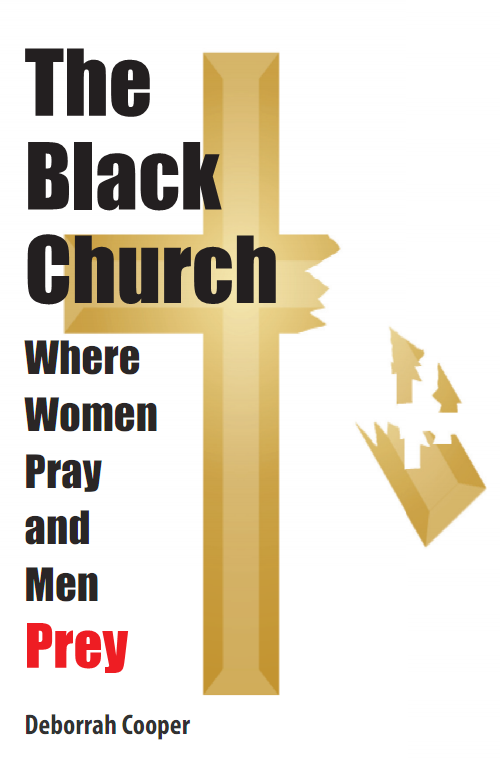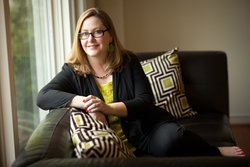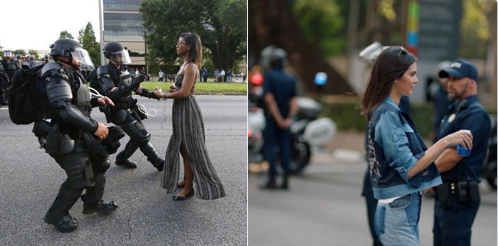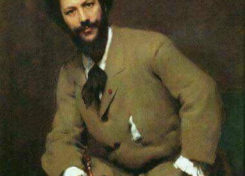Raise your hand if you’ve heard the following explanations given for the reasons that more Black women are single these days: Bossy. Bitter. Unrealistic standards and an unwillingness to compromise or accept less than their ideal Mr. Right.
If none of those rang true to you either, then you’ll understand why author and seasoned relationship blogger Deborrah Cooper decided to investigate deeper and found two startling factors that drove her to write a post that started a phenomenon: The Black Church—How Black Churches Keep African American Women Single and Lonely.
When the response generated everything from kudos to criticism about her motives and accusations and whether or not she even believed in The Lord, Ms. Cooper further underscored the argument with more proof and research in her newly-published book entitled The Black Church: Where Women Pray and Men Prey.
Accustomed to controversial topics and willing to expound on the hot-button issue, Ms. Cooper spoke with me by phone about how Black churches can lead women astray, how its leaders help to perpetuate many of the ills plaguing Black communities and what can be done to end the problems altogether:
CHOCOLATE MAMA-I know you caught a lot of flack when the post first went viral Ms. Deborrah, but now that the book is out, what type of response have you received?
DEBORRAH COOPER- “‘The timing for the publication of the book was perfect, because by the time it came out, news stories involving pastors doing all of the things that I had outlined in the book were all over the news, which made it kind of difficult for people to say ‘that’s not true, you’re just attacking the church.’ They were trying to blame it on me, but story after story came out validating what I said.”
CM-It almost seems like the most defensive about their churches and pastors are the women who’ve been exploited the most, which is kind of like a strange variation of the ‘Stockholm Syndrome’ that compels them to protect these predator-type church leaders.
DC- “That’s an excellent way of describing it. There’s a certain mentality that you have to have in order to be a deeply religious person: One characteristic is accepting things without question— they call it ‘faith,’ but when you have a whole race of women who’ve been indoctrinated with that mindset, of being trained to not question or look into finding deeper answers and not just take things at face value, generations of people with that type of upbringing have certainly contributed to the vast numbers of Black women who’ve been negatively impacted by the Black church right now.”
CM-In your book, you went into great detail to outline just how and when the Black church stopped being a nerve center for the community and is now more of a place to socialize and monetize. Do you have a theory as to why men have stopped attending church to the point where they’re only 20 percent of the congregation?
DC- “Just as there can only be one man as head of the household, there can only be one man at the head of the church. From what we’ve seen, the majority of the men who preach the ‘prosperity gospel’ are greedy and power-driven: their personalities are very dominant, controlling and they’re used to having what they want and intimidating people, what most would call a ‘commanding presence.’ If you look at Creflo Dollar, TD Jakes and Leroy Price, they have those traits, and if you have men that are socialized to be independent and not be followers, they’re not going to go to a church, get on their knees and submit to some older dude who’s not their dad—-it’s not gonna happen.”
CM-How can churches increase Black male involvement and participation?
DC- “There has to be some kind of change in structure of the churches to create more of a group dynamic that will allow other men more input in how it’s ran and how ministries and programs are developed. Men work better in teams that have someone in command to report to, like in the military, but are still allowed to have input and feel like they are valued. Currently it’s a dictatorship, and that’s not attractive to them.”
CM-How do you feel that some Black churches have made male and female relations so difficult?
DC- “Well, besides women being manipulated into looking for perfection or lulled into just having Jesus as her man, I’ve found that you just won’t see any response from the religious community when it comes to advocating for them. As far as the religious leaders are concerned, the men are the important ones and women are simply support staff. Who’s the most affected by AIDS? Women. Where do they primarily get it from? Men, so they don’t want to talk about that. And if something like domestic violence comes up, the female victims are simply told that they must’ve done something wrong to get hit and didn’t submit to their husbands enough. Everything is blamed on the woman: that is a consistent problem, and that’s why I state, in the end of my book, that black women are under siege and that there is a war in the black community against Black women and Black children. It’s the same as white men who may not have owned slaves, but they still benefited from the practice: there is a vested interest in keeping things as is because men benefit from it, so they won’t speak up in their favor.”
CM- Can you elaborate on that ‘martyrdom’ you discussed in…Prey?
DC- “Black women are so used to be being held responsible and accountable for everything in their household, the community and even for Black men, that they don’t know how to put that down. Some feel pride by declaring ‘I’m a strong Black woman,’ not realizing that they’ve put themselves into a box. Women really have to step back and think of all the ways that they’ve been giving to Black men and why they’re getting little or nothing in return. Black women have to get out of their Bibles and stand up for themselves. The spiritual aspects and the moral values are beneficial, but anything that puts you in a position of inferiority or makes you feel that you need to endure mistreatment, you have to understand that it’s wrong and make those changes.
For example, some say ‘I’m helping to build up the church,’ but they rarely ask where their money is going. If you can’t tell where it’s being spent and they refuse to show you or explain to you, then stop giving money to that church immediately. I don’t understand how Creflo Dollar has a plane and lives in a gated community in this giant mansion, but many of his congregation are piling sixteen –deep into cars or catching buses to get into his church. The money should be invested in your home and family, not being given to a multi-millionaire.”
CM- Have you ever encountered a church or a religious leader who was moved by what you wrote and became inspired to do things differently?
DC-“There was a pastor who told me, during a discussion, that it wasn’t his responsibility to bring other black men into the church. I said, ‘Are you kidding me? If it’s not your responsibility, then whose is it? You positioned yourself to be a leader in the community by opening that church, and it comes with a responsibility to be accountable to all of the souls, not just the ones with the big butts and big wallets.’ I chewed him up one side and down the other, but I have to give him credit because he got in touch with me a few months later, apologized and told me that he and his church board are now creating programs that will bring more men into the church.”
CM-Excellent! Since women are the ones who are the underdogs in this scenario, how can they turn things around?
DC- “The first thing that women have to understand is that they have a lot of power that they’re not using. The churches exist because women fund them, and if they stopped going to these male-centered churches and better yet, started their own churches that would focus on their needs and their children’s needs, it would be more enriching to them.I would suggest to women that they instead of tithing to churches, they tithe to themselves. Open a bank account and put that ten percent aside for themselves and their babies: that way, if you need it, you’ll have it. Why give it to a pastor to go buy another Bentley? That is economic empowerment and will increase self-esteem.
Also, women should stop thinking that they’re less than or nothing just because there’s not a man in their lives: wait for the right man, not just any man. This needs to be emphasized to the younger women especially, they need to be patient. Get up and be active in your community where people can see you and don’t settle. It will cut down on a lot of the drama that many of them have.”
CM- To wrap it all up Ms. Deborrah, what do you believe the future holds for Black churches?
DC- “We have many other systems in place providing social structure, so if certain churches aren’t providing scriptural knowledge, there’s just not a point for them. This ‘prosperity gospel ‘stuff is only to make people rich, but the smaller churches that offer study groups and actively study the scriptures, that’s a better place. Otherwise, I don’t see where churches are necessary anymore: they don’t fulfill the purposes that they used to and half don’t fill the purposes that they’re designed for. I know that’s a controversial statement, but that that’s how I see it.”






